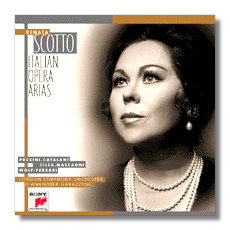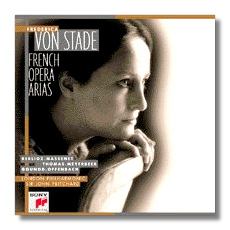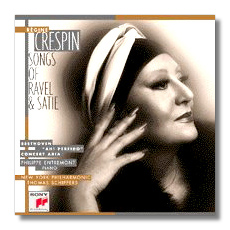
The Internet's Premier Classical Music Source
Related Links
- Latest Reviews
- More Reviews
-
By Composer
-
Collections
DVD & Blu-ray
Books
Concert Reviews
Articles/Interviews
Software
Audio
Search Amazon
Recommended Links
Site News
 CD Review
CD Review
Songs & Opera Arias

Italian Opera Arias
- Scenes and arias from:
- Le villi
- Manon Lescaut
- La bohème
- Suor Angelica
- Gianni Schicchi
- La Wally
- Adriana Lecouvreur
- La rondine
- Lodoletta
- Iris
- Edgar
- Madama Butterfly
- Il Segreto di Susanna
Renata Scotto, soprano
London Symphony Orchestra/Gian Andrea Gavazzeni
Sony Classical SMK60524 ADD 74:08


French Opera Arias
- Scenes and arias from:
- Béatrice et Bénédict
- Werther
- Cendrillon
- La damnation de Faust
- Mignon
- Les Huguenots
- Roméo et Juliette
- La Grande-Duchesse de Gérolstein
- La Périchole
Federica von Stade, mezzo-soprano
London Philharmonic Orchestra/John Pritchard
Sony Classical SMK60527 ADD 51:32


Songs of Ravel & Satie
- Maurice Ravel: Histoires Naturelles
- Erik Satie: Songs (8)
- Ludwig van Beethoven: Ah! perfido, Op. 65*
Régine Crespin, soprano
Philippe Entremont, piano
* New York Philharmonic Orchestra/Thomas Schippers
Sony Classical SMK60577 ADD 54:51
Once again, Sony has gone back into its excellent back catalog and pulled out three plums. These three releases are part of a larger series that Sony is calling "Vocal Masterworks" – current releases include discs by Ileana Cotrubas and Beverly Sills. Each booklet features an introduction by the diva herself, who puts the recordings into the context of her career. Full texts and translations also are included, which is an unusual but welcome feature.
Most of the material on Scotto's disc comes from her first American LP, which was recorded in 1974. (The remainder is taken from complete opera sets recorded between 1977 and 1980.) Scotto didn't lower her standards when she sang verismo roles; she maintained the same dignity, with dramatic involvement, that she gave to her performances of Verdi and Bellini. One has to go back to Maria Callas and Magda Olivero to find the same mix of affinities; an earlier prototype would be Claudia Muzio. Although her voice is no more beautiful, in the traditional sense, than that of any of those three great ladies, it runs the gamut from exquisite tenderness to searing power. Most Americans never heard Scotto sing with more control and resources than this. For me, the biggest discovery on this disc was the 11-minute scene that closes Ermanno Wolf-Ferrari's one-acter Il Segreto di Susanna. Susanna's secret is that she smokes. Her husband (sung well by baritone Renato Bruson) suspects her of having a lover, and is relieved to discover that all his wife is hiding from him is a pack of ciggies. They decide that the couple that smokes together is the couple that loves together, and the opera ends with the happy pair heading offstage for an activity that usually precedes smoking, rather than following it! Scotto, who is adorable here, delighted me with her vocal acting. The music is delicious too, and I note with sadness that Sony seems not to have the complete recording of this opera in its catalog now.
Federica von Stade does a wonderful job bringing the subtler French spirit to life on her CD. This was recorded in 1976, somewhat early in her career. The CD is the exact equivalent of the Columbia LP, with no additional material. Von Stade is a more restrained singer than Scotto, but she knew what repertoire was best for her (basically, Mozart and the French wing), and the sound of her voice itself is very beguiling. Her vibrato smiles, and so she makes the most positive impression when she is not trying to be tragic, impressive as "Va! laisse-moi couler mes larmes" is. The longer Berlioz scenes show that she is a sensitive actress, but my favorite selections are "Connais-tu le pays," which is warmly nostalgic, and the two Offenbach arias. Périchole's drunken song has become a favorite von Stade encore, but subsequent recordings don't surpass the present one. Pritchard conducts respectfully, without giving this music any special touches of personality. All in all, this recording gives plenty of explanations why Federica von Stade has been one of the most beloved of American singers wherever she goes. It is good to hear her again in peak form.
In the introduction to her disc, Régine Crespin admits that she's never heard her own recording of the Ravel and the Satie! "People have often told me," she writes, "that they are successful performances, so perhaps I will think so too when I hear the new CD!" She shouldn't worry, because I think they are very successful indeed. Ravel's Histoires Naturelles, with words by Jules Renard, shows the same tender love for animals that the composer showed in his opera L'Enfant et les sortilèges. It is obvious that Crespin also is moved by these delicate but unsentimental little portraits of a peacock, a cricket, a swan, a kingfisher, and a guinea fowl. The Satie songs give her opportunities to be silly (Le Chapelier, Chanson du chat) and very grand, like the best cabaret lady (John Cage's beloved Je te veux and La Diva de "L'Empire"). It was an inspired idea to pair Crespin with Philippe Entremont, who takes his accompanying job unashamedly. The only other thing to note about these recordings, which were made in 1979, was that Crespin's voice was getting more and more blustery at this time, but not enough to bother me greatly. The Beethoven concert aria was recorded in 1965. Crespin response to its drama is almost haughty. Here her voice is more controllable, although the downward runs near the end of the aria (admittedly difficult for any soprano) are more swooped than articulated.
Copyright © 1999, Raymond Tuttle




















